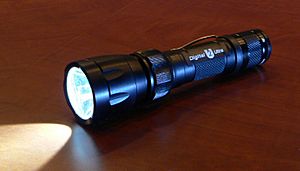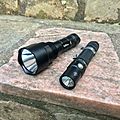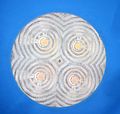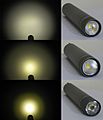Flashlight facts for kids
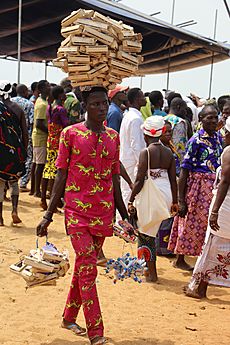
A flashlight is a small, portable light. In North America, it's called a flashlight. In many other countries, like those in the Commonwealth, it's known as a torch. Its main job is to create a beam of light to help you see in the dark. Most flashlights need batteries to work.
The light usually comes from a small light bulb. A long time ago, in the 1900s, flashlights used incandescent bulbs. These bulbs glowed when a thin wire inside got hot. Today, most flashlights use LEDs. LEDs are different because they create light using tiny electronic parts, making them more energy-efficient.
In 1896, the first dry cell battery was invented. This battery was special because it used a paste inside instead of a liquid. This meant it wouldn't spill or break easily. It was the first battery that was good for portable devices like flashlights. Sometimes, a flashlight can even get its power from a small generator instead of batteries.
How Flashlights Were Invented
Hundreds of years ago, people used candles for light indoors. Candles were expensive, and when they burned out, you had to get a new one. This left people in the dark if they didn't have more.
When electricity was discovered and the light bulb was invented, people started thinking about new ways to use light. In 1898, a British man named David Misell was working in New York. He had a clever idea: what if you could take a light bulb with you anywhere?
That's how the first modern flashlight was invented! It used three D-sized batteries to power a small incandescent bulb. You could simply flip a switch to turn the light on or off. This made it much easier to see in the dark, especially when you were on the go.
Images for kids
-
The angle-head flashlight on the left uses an incandescent bulb, while the adjustable angle-head flashlight on the right uses LEDs to give white, red, blue, and infrared light
-
A medical halogen penlight to observe pupillary light reflex
-
IPhone XR Flashlight
See also
 In Spanish: Linterna eléctrica para niños
In Spanish: Linterna eléctrica para niños
 | Leon Lynch |
 | Milton P. Webster |
 | Ferdinand Smith |


